The better question
Welcome to Love Mondays, a weekly newsletter designed as a 3-minute hit to fire up the other 10,077 minutes of your week.
‘It’s not the answer that enlightens, but the question.’ – Eugene Ionesco
The better the question, the more revealing the answer. How many questions do we ask every day? How many of our questions are designed to reveal hidden truths? If we are not hoping to learn a new truth, why do we question?
What is the question you need to ask this week?
Write it down.
Consider: do you understand the inherent limitations of the questions you're currently asking?
Practice: pausing, after your brain generates an initial question, and ask yourself, ‘What’s the better question?’
Decide to: ask the better question
The better question
I was fortunate to speak with one of the world’s best questioners, Genevieve Bell. Genevieve is a distinguished professor at ANU, a Director at the School of Cybernetics, a Director of Autonomy, Agency and Assurance at the 3A Institue and a deadset legend. I’d like to share some of Genevieve’s thoughts on asking questions that intentionally reveal the truth of context:
“At the School of Cybernetics, we ask, what is the future that is being imagined here? How is that data being used? What are the inherent biases and limitations of that data and other worlds we’re imagining with it?”
A question that applies both imagination and logic is a better question. Or in Genevieve’s language, a question that probes in such a way as to be “a step up.”
“Taking a step up is about pushing further on the ‘why’ and asking questions on the intentionality of something. If I give an example where you’re developing an app that will help me buy a sweater to go with my pants, I want to know what the intention of the app is. And sometimes we’re not good at pausing to really answer that question. Asking the right questions is about imagining a world of fast fashion and a world of just-in-time supply chain. You are imagining a world of credit cards, you are imagining a world of data trails, you are imagining a world of multiple other systems, you’re imagining a world of desire, you’re imagining a world where matching makes sense.
And so I think one of the things we aren’t good at is pausing to ask the question, what is this world?
I’d love to hear about the questions you are asking this week. Feel free to drop them in the comments 💬 thread below!


